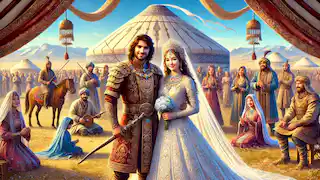In the vast, windswept steppes of Central Asia, the rhythm of life was dictated by the cycles of nature. The land stretched endlessly, its golden grasses bending beneath the wind, and the mountains in the distance stood as timeless guardians. It was a land of stories, where legends were passed from one generation to the next, and among these tales, none was more cherished than the love story of Kozi-Korpesh and Bayan-Sulu. Long before the events of this story unfolded, two noble families ruled neighboring territories. Though separated by great distances, the bond between these two clans was as strong as iron. The patriarchs, Kozi-Korpesh’s father and Bayan-Sulu’s father, were sworn brothers in spirit if not in blood. They had faced countless challenges together—harsh winters, rival raids, and the unyielding tests of the steppe. One evening, as they shared a meal under the stars, warmed by the glow of a fire, they made a solemn vow. If fate were kind and one father had a son while the other had a daughter, their children would be betrothed to each other. The marriage, they believed, would unite their families forever, binding their fates in harmony. Fate listened. It was during a particularly harsh winter that Bayan-Sulu was born. Her arrival was marked by the shimmering aurora that danced across the sky. Her parents, joyous despite the biting cold, named her Bayan-Sulu, which meant “Beautiful Treasure.” Even as an infant, she captivated everyone around her with her bright eyes and curious gaze. On the other side of the steppe, Kozi-Korpesh was born under different circumstances. A warm spring heralded his arrival, a season of renewal and strength. As a child, Kozi-Korpesh embodied the spirit of the steppe—fearless, resilient, and determined. The two children grew up in their respective homes, blissfully unaware of the destiny awaiting them. Kozi-Korpesh trained as a warrior, learning to ride before he could even walk properly. By the time he was a young man, he could command a horse with unmatched skill, his arrows never missing their target. Bayan-Sulu, meanwhile, was renowned for her wisdom and kindness. Her beauty was spoken of in every corner of the steppe, but it was her intellect and compassion that truly set her apart. When the children reached the age of maturity, their fathers reminded them of the sacred bond forged before their births. Arrangements were made for a formal introduction, and the day finally came when Kozi-Korpesh and Bayan-Sulu met for the first time. Their meeting took place under a canopy of stars, with their families gathered in celebration. From the moment their eyes met, it was as if the universe conspired to bring them together. Kozi-Korpesh, tall and strong, was captivated by Bayan-Sulu’s grace and intelligence. Bayan-Sulu, in turn, admired Kozi-Korpesh’s courage and noble demeanor. That night, as the elders celebrated the renewal of their oath, Kozi-Korpesh and Bayan-Sulu spoke for hours, discovering not only an obligation but a profound and genuine connection. Over the next several months, Kozi-Korpesh and Bayan-Sulu’s love deepened. Unlike many arranged marriages of the time, theirs blossomed naturally, built on mutual respect and affection. Kozi-Korpesh, though known for his strength, revealed a tender and poetic side. He wrote verses for Bayan-Sulu, each line capturing the beauty of the steppe and his feelings for her. He once likened her to the sun that warmed the grasslands after a harsh winter, a light that could banish any darkness. Bayan-Sulu, who was skilled in the arts of music and storytelling, composed songs for Kozi-Korpesh. Her voice was like the wind, soft yet powerful, carrying her melodies far and wide. Villagers from distant lands would pause their work just to listen when she sang. Just as their love seemed destined to culminate in a joyous union, a shadow fell over their lives in the form of Khodzhar, a wealthy and ambitious nobleman. Khodzhar had heard tales of Bayan-Sulu’s beauty and decided that she must belong to him. He arrived unannounced at her family’s camp, dressed in fine silks and bearing gifts of gold, jewels, and precious horses. “Your daughter deserves a husband of great wealth and power,” Khodzhar proclaimed to Bayan-Sulu’s father. “I can offer her a life of luxury, far beyond anything Kozi-Korpesh can provide.” Bayan-Sulu’s father hesitated. Khodzhar’s wealth was undeniable, and his influence stretched far across the steppe. But the oath he had sworn with Kozi-Korpesh’s father weighed heavily on his conscience. Bayan-Sulu, upon learning of Khodzhar’s proposal, stood firm. “I am not an object to be traded for gold,” she declared. “My heart belongs to Kozi-Korpesh, and no wealth can change that.” Khodzhar, enraged by Bayan-Sulu’s rejection, challenged Kozi-Korpesh to a duel, hoping to eliminate his rival once and for all. The duel was to take place at sunrise on the open plains, witnessed by both families and their followers. The battle was fierce. Kozi-Korpesh, armed with his bow and sword, faced Khodzhar, who wielded a heavy spear. The two warriors clashed, their weapons striking with the force of thunder. Kozi-Korpesh, though younger and less experienced, fought with the ferocity of a lion defending its pride. In the end, it was his speed and precision that won the day. Khodzhar fell, defeated but not dead, his pride shattered. With Khodzhar out of the way, preparations for the wedding resumed. The ceremony was a grand affair, with families from across the steppe gathering to celebrate. The bride and groom exchanged vows beneath the endless sky, their union blessed by the elders and the spirits of the land. As they rode together on horseback into the horizon, their love seemed unbreakable, their future bright and full of promise. But Khodzhar’s defeat did not mean the end of his schemes. He retreated to his stronghold, plotting revenge. Months later, he launched a surprise attack on Kozi-Korpesh, ambushing him while he was traveling alone. Though Kozi-Korpesh fought valiantly, he was gravely wounded. Word of the attack reached Bayan-Sulu, who rushed to his side, but it was too late. Kozi-Korpesh succumbed to his injuries, leaving Bayan-Sulu heartbroken. In her grief, Bayan-Sulu refused to marry anyone else. She constructed a monument in Kozi-Korpesh’s honor, a towering statue that stood as a symbol of their undying love. The monument became a place of pilgrimage, visited by lovers seeking guidance and solace. Though centuries have passed, the tale of Kozi-Korpesh and Bayan-Sulu endures. Their love, marked by trials and triumphs, serves as a reminder that true devotion transcends even death. Their spirits, it is said, still roam the steppes, together forever beneath the stars. {{{_04}}}The Oath of Two Families
The Births of Kozi-Korpesh and Bayan-Sulu
The First Meeting

Courtship in the Steppe
The Rivalry of Khodzhar
The Duel of Honor

The Wedding of Kozi-Korpesh and Bayan-Sulu

The Final Test
Legacy
Kozi-Korpesh and Bayan-Sulu
Reading Time: 6 min

About Story: Kozi-Korpesh and Bayan-Sulu is a Legend Stories from kazakhstan set in the Ancient Stories. This Poetic Stories tale explores themes of Romance Stories and is suitable for All Ages Stories. It offers Cultural Stories insights. A timeless tale of love, courage, and sacrifice in the boundless steppes.

















